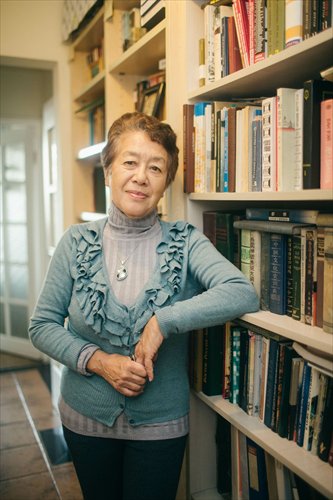A Russian-Chinese woman witnesses the ups and downs of the two nations’ tiesPosted in Articles, Asian Diaspora, Biography, History, Media Archive on 2016-01-17 22:45Z by Steven |
A Russian-Chinese woman witnesses the ups and downs of the two nations’ ties
Global Times: Discover China, Discover The World
2015-10-30
Zhou Yu
 Li Yingnan stands in her home. Her home is filled with Chinese and Russian books and decorations. Photo: Li Hao/GT |
It was a sunny August day in Moscow when three shuttle buses stopped at Red Square. A group of women were the first of the dozens of tourists to step off the buses. Though their appearances were barely different from those of ordinary Russians, they were, in fact, Chinese citizens, aged between 50 to 80.
“I was born in Moscow,” said one 80-year-old lady tearfully.
The ladies belonged to a tour group called Russian Mothers Seeking Roots in Russia, and all were the descendants of Russians. It was the first time since the end of World War II that a group of people seeking their roots had been organized by Chinese citizens.
For the next seven days, they would tour major sites in Moscow and St. Petersburg. These old ladies were so excited to see their ancestors’ hometowns, some even dancing on Red Square. Russian WWII veterans told them about the joint military operations between the two countries during the war.
Most of the group members’ mothers were Russians who came to China during the 1930s. In the 1920s, there were around 200,000 Chinese laborers who lived and worked in Russia doing construction work or running shops. Some Chinese workers participated in the Russian Revolution in 1917, and others even joined Russia’s Red Army.
At the end of the 1920s, when the Soviet Union’s strict economic planning system was implemented, the Soviet government closed down all private shops and forced Chinese shop owners to leave the country. Many of these Chinese businessmen had married Russian women, who followed their husbands back to China. Due to Russia’s geographical proximity of Xinjiang, most of these Russian-Chinese couples settled in Xinjiang and the women became Chinese citizens. There are around 15,000 such descendants of Russians still in China…
Read the entire article here.




